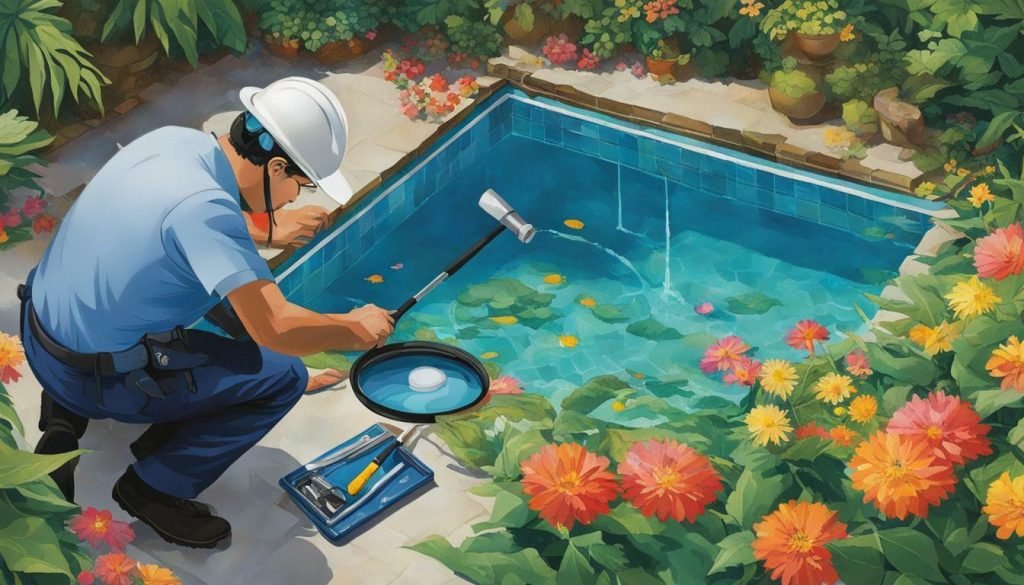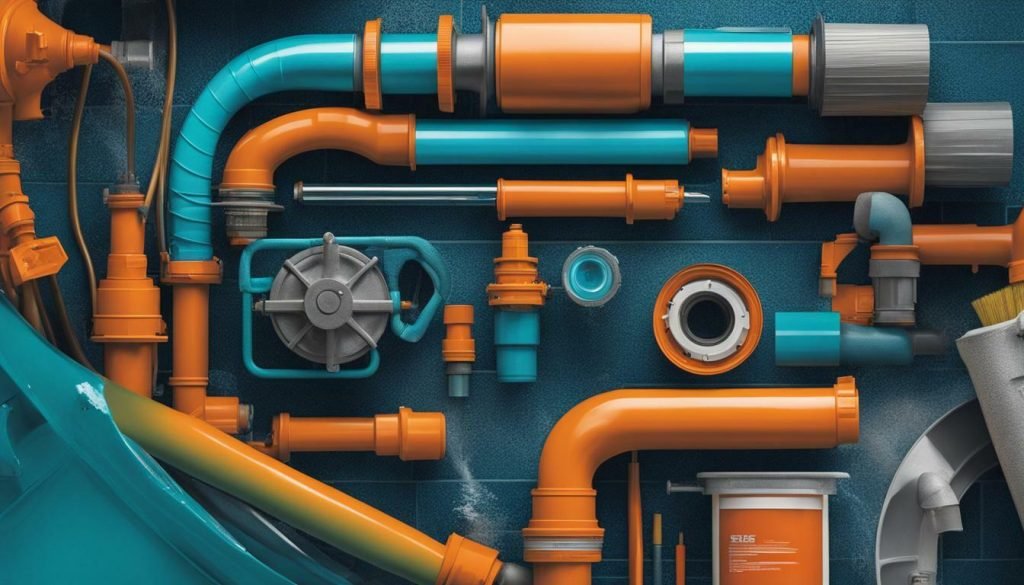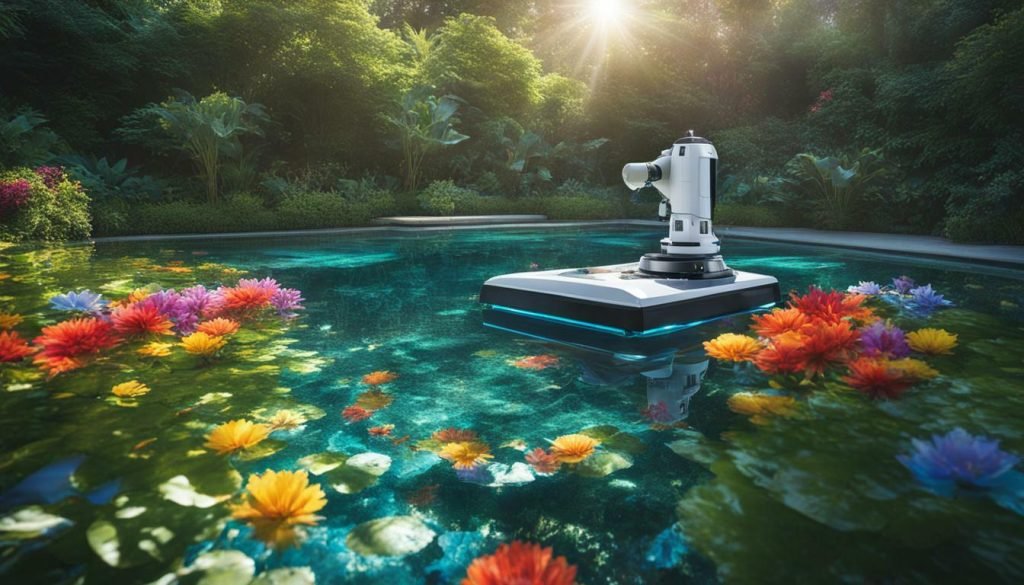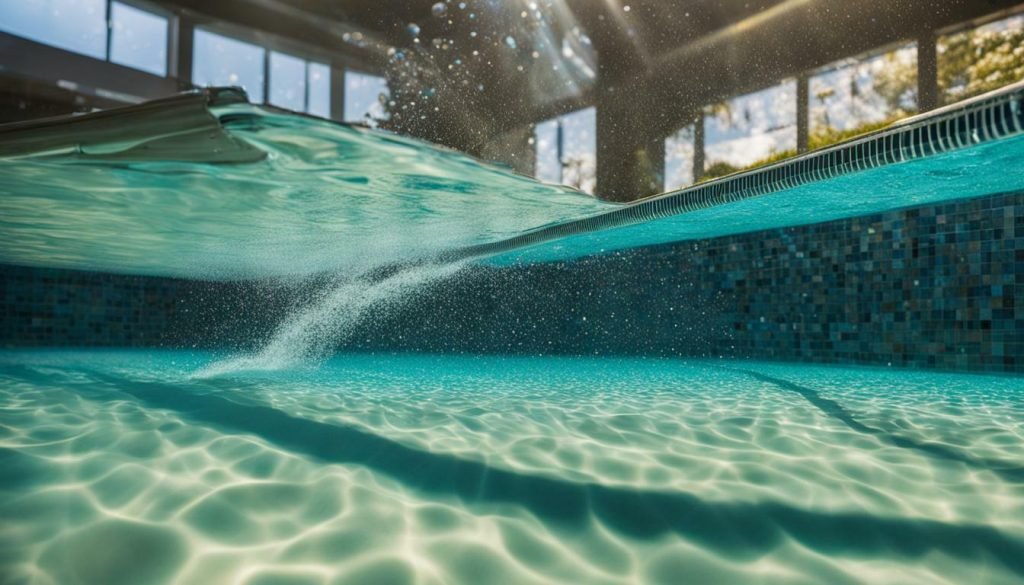Welcome to our guide on pool maintenance tips to help you make the most of your summer swimming experience in South Africa. Proper pool care is essential for a clean and safe swimming environment, ensuring you can enjoy your pool to the fullest. From checking for leaks to maintaining the chemical balance, we’ll cover all the key areas of pool maintenance to keep your pool in top condition. So dive in and let’s get started!
Key Takeaways:
- Regularly check for leaks and cracks to prevent costly repairs
- Maintain proper filtration and equipment maintenance for efficient pool operation
- Hire professionals to clean the pool surface and maintain chemical balance
- Monitor and adjust pH levels for a comfortable swimming experience
- Maintain the water level for proper circulation and filtration
Now that you have an overview of what’s to come, let’s dive deeper into each of these important pool maintenance tips. By following these recommendations, you’ll create a pristine pool oasis for endless summer enjoyment in South Africa.
Regular Inspection and Leak Prevention
Regular inspection of your pool is crucial to identify and address any leaks or cracks that may occur. Taking the time to inspect your pool regularly can save you from costly repairs down the line. Start by visually examining the pool’s walls, floor, and surrounding areas for any signs of damage. Look out for cracks, chips, or areas where the pool surface seems to be deteriorating. If you notice any abnormalities, it’s important to address them promptly to prevent further damage.
Additionally, check the pool’s equipment, such as pumps, filters, and valves, for any leaks. A small leak may not seem like a big issue, but over time it can lead to significant water loss and damage to your pool system. Make sure to also inspect the pool’s plumbing and connections for any signs of leakage. Taking care of these leaks early on can save you money on water bills and prevent potential issues with your pool’s performance.
To enhance the effectiveness of your inspection, consider using a pool leak detection kit. These kits can help you identify leaks by detecting changes in water pressure or by using dye testers to pinpoint the exact location of a leak. If you’re unsure about conducting the inspection yourself, it’s always a good idea to seek professional assistance. Pool maintenance experts have the knowledge and experience to assess your pool thoroughly and address any issues they come across.
Table 1: Signs of Pool Leaks
| Signs | Description |
|---|---|
| Excessive water loss | If you notice a significant drop in your pool’s water level, it may indicate a leak. |
| Cracks or gaps | Inspect the pool’s surface for cracks or gaps that could be potential entry points for water leakage. |
| Wet spots | If you find wet spots around the pool area, it may indicate an underground leak. |
| Inconsistent water chemistry | Leaks can disrupt the pool water’s chemical balance, leading to imbalances in pH and chlorine levels. |
By regularly inspecting your pool for leaks and promptly addressing any issues, you can ensure the longevity and structural integrity of your pool. Not only will this save you from expensive repairs, but it will also provide you with peace of mind, knowing that your pool is in top condition for a summer filled with fun and relaxation.

Proper Filtration and Equipment Maintenance
To maintain pristine pool water, it is essential to ensure proper filtration and regularly maintain your pool equipment. A well-functioning filter is crucial for removing dirt, debris, and other contaminants from the water, keeping it clean and safe for swimming. Make sure your filter is running smoothly and not clogged with dirt or debris, as this can affect its efficiency.
In addition to the filter, other pool equipment such as pumps, valves, and skimmers also play a vital role in maintaining the water’s cleanliness. Regularly inspect these components to ensure they are working correctly and free from any blockages or damage.

By properly maintaining your pool equipment and ensuring optimal filtration, you can enjoy crystal-clear water all summer long. Regular maintenance will also prolong the lifespan of your equipment and prevent costly repairs down the line.
| Benefits of Proper Filtration and Equipment Maintenance: | |
|---|---|
| 1. Cleaner and safer swimming environment | |
| 2. Improved water clarity | |
| 3. Longer lifespan of pool equipment | |
| 4. Prevents clogging and damage to the filtration system |
To maintain proper filtration and equipment maintenance, follow the manufacturer’s instructions and consult a professional if needed. By prioritizing the upkeep of your pool’s filtration system and equipment, you’ll be able to enjoy a clean and inviting pool all summer long. Additionally, it’s essential to recognize when to hire pool maintenance experts, especially if you encounter issues that are beyond basic troubleshooting. They can provide specialized knowledge and services that ensure your pool remains in optimal condition. Regular assessments by professionals can save you time and prevent costly repairs down the line.
Professional Pool Cleaning and Chemical Balance
Keeping your pool clean and maintaining the chemical balance of the water is best achieved by hiring professionals who specialize in pool maintenance. They have the knowledge and expertise to ensure your pool remains pristine and safe for swimming throughout the South African summer.
One of the key aspects of professional pool maintenance is thorough pool surface cleaning. Professionals use specialized tools and techniques to remove debris, algae, and other contaminants from the pool’s surface. This not only enhances the appearance of your pool but also prevents the growth of harmful bacteria and keeps the water crystal clear.
Additionally, maintaining the chemical balance of the water is crucial for a safe and enjoyable swimming experience. Professionals regularly test and adjust the pH levels, ensuring they remain within the optimal range. This helps to prevent skin and eye irritation, as well as minimize the risk of bacteria and algae growth.
To give you an idea of the importance of chemical balance, did you know that incorrect pH levels can impact the effectiveness of your pool’s chlorine? If the pH is too high or too low, the chlorine in your pool will become less effective at killing bacteria and sanitizing the water.
| Chemical | Ideal Range |
|---|---|
| pH | 7.2 – 7.6 |
| Chlorine | 2 – 4 ppm |
| Alkalinity | 80 – 120 ppm |
By hiring professionals, you can rest assured that your pool will be properly maintained and the chemical balance will be regularly monitored and adjusted. This allows you to enjoy a clean and safe swimming experience, free from any worries about water quality or maintenance tasks.

Remember, maintaining a clean and well-balanced pool is essential for elevating your summer pool experience. Leave the hard work to the professionals and enjoy a stress-free swim in your own personal oasis.
Monitoring and Adjusting pH Levels
To ensure a comfortable and safe swimming experience, it is crucial to monitor and adjust the pH levels of your pool water. pH levels measure the acidity or alkalinity of the water, and maintaining the correct balance is essential for optimal water quality.
When the pH level is too high, it can cause skin and eye irritations, while low pH levels can lead to corrosive effects on pool equipment and surfaces. The ideal pH range for your pool water is between 7.2 and 7.6, slightly on the alkaline side.
To monitor the pH level, you can use pool water testing kits or take a sample to your local pool supply store for analysis. If the pH levels are not within the recommended range, you can adjust them using pH increasers or decreasers, which are readily available in pool care products.
Regularly checking and adjusting the pH levels of your pool water will ensure a comfortable swimming experience for you and your family. It will also help to maintain the integrity of the pool equipment and surfaces, prolonging their lifespan and reducing the need for costly repairs in the future.
Importance of pH level in a swimming pool
| pH Level | Effect on Swimmers | ||
|---|---|---|---|
| Too high (above 7.6) | – Skin and eye irritations | – Decreased effectiveness of chlorine as a sanitizer | |
| Too low (below 7.2) | – Corrosive effects on pool equipment and surfaces | – Increased risk of staining and etching | |
| Ideal range (7.2 – 7.6) | – Optimal comfort for swimmers | – Proper functioning of chlorine and other sanitizers | – Protection of pool equipment and surfaces |
Remember, maintaining the proper pH level is just one aspect of pool care. Be sure to regularly test and adjust other chemical levels, such as chlorine and alkalinity, to ensure a well-balanced pool. By following these pool maintenance tips, you can create a pristine pool oasis for endless summer enjoyment.

Water Level Maintenance
Keeping an eye on the water level in your pool is essential for proper circulation and filtration, ensuring clean and clear water for swimming. Maintaining the right water level not only helps the pool’s equipment function efficiently but also ensures a safe and enjoyable swimming experience.
During hot South African summers, evaporation can cause the water level in your pool to drop. It’s important to regularly monitor and adjust the water level to prevent any issues. A low water level can lead to inadequate filtration and circulation, resulting in stagnant water and potential algae growth.
To maintain the proper water level, you can use a garden hose to add water when necessary. It’s recommended to aim for the midpoint of the pool skimmer for an optimal water level. If the water level is too high, you can use a submersible pump or pool cover pump to remove excess water.
| Reasons to Maintain Proper Water Level: | Actions to Take: |
|---|---|
| Ensure proper filtration and circulation | Monitor water level regularly and add water as needed |
| Prevent stagnant water and potential algae growth | Use a garden hose to add water to reach the midpoint of the pool skimmer |
| Promote a safe and enjoyable swimming experience | Remove excess water with a submersible pump if water level is too high |
By maintaining the proper water level in your pool, you can ensure that water is effectively circulated and filtered, keeping it clean and safe for swimming. Regularly monitor the water level and take necessary actions to maintain it within the recommended range. With a well-maintained water level, you’ll be able to enjoy a refreshing dip in your pool all summer long.

Routine Pool Vacuuming
Regularly vacuuming your pool floor is vital to prevent the buildup of dirt and harmful microbes, maintaining a hygienic swimming environment. A clean pool floor not only looks inviting but also ensures a safe and enjoyable swimming experience for you and your family.
To effectively vacuum your pool, start by skimming the surface to remove any large debris such as leaves or twigs. This will prevent them from sinking to the bottom and making the vacuuming process more difficult. Next, attach the vacuum head to the telescopic pole and connect it to the vacuum hose. Slowly move the vacuum head across the pool floor, ensuring that you cover every inch to remove any dirt or debris.
It is recommended to follow a regular vacuuming schedule, depending on the level of pool usage and the surrounding environment. For heavily used pools or areas with high foliage, it may be necessary to vacuum the pool floor at least once a week. However, for less frequently used pools or areas with minimal debris, vacuuming every two weeks should be sufficient.
| Frequency of Pool Vacuuming | Pool Usage and Surrounding Environment |
|---|---|
| Once a week | Heavily used pools or areas with high foliage |
| Every two weeks | Less frequently used pools or areas with minimal debris |

Remember, maintaining a clean and hygienic pool floor is essential for a safe swimming experience. Regular vacuuming helps prevent the accumulation of dirt and harmful microbes, ensuring that your pool remains a pristine oasis for endless summer enjoyment.
By incorporating regular pool vacuuming into your maintenance routine, you can keep your pool in optimal condition throughout the South African summer. So grab your vacuum and get ready to dive into a sparkling clean pool!
Conclusion
By implementing these pool maintenance tips, you can create a clean and safe swimming environment, elevating your South African summer to new heights of enjoyment.
To ensure a pristine pool oasis, it is crucial to check for leaks and cracks regularly. This proactive approach can help prevent costly repairs and keep your pool in top condition.
Proper filtration is another key aspect of pool maintenance. Be sure to keep your filter running and free from dirt or debris. This will help maintain water clarity and prevent any potential issues with the pool’s functionality.
Hiring professionals to clean the pool surface and maintain the chemical balance of the water is highly recommended. They have the expertise and tools to ensure your pool remains clean, algae-free, and safe for swimming.
Monitoring and adjusting the water’s pH level is essential for a comfortable swimming experience. By keeping the pH within the optimal range, you can prevent skin and eye irritation and maintain water quality.
Additionally, paying attention to the water level is important for proper circulation and filtration. Ensure the water level is maintained at the recommended level to promote optimal pool performance.
Routine pool vacuuming is also crucial in preventing the accumulation of dirt and microbes on the pool floor. By keeping the pool floor clean, you can create a hygienic swimming environment for you and your family.
By following these pool maintenance tips, you can enjoy a clean and safe swimming experience throughout the South African summer. So dive in and make the most of the season in your immaculately maintained pool!
FAQ
Why is proper pool maintenance important?
Proper pool maintenance is important to ensure a clean and safe swimming experience. It helps prevent costly repairs, maintains proper water balance, and extends the life of pool equipment.
How often should I check for leaks and cracks in my pool?
It is recommended to regularly inspect your pool for leaks and cracks at least once a month. This will help identify any issues early on and prevent further damage.
How do I maintain proper filtration and equipment?
Ensure that your pool filter is running and not clogged with dirt or debris. Regularly clean or replace the filter cartridge and backwash the system as needed to maintain proper filtration.
Should I hire professionals for pool cleaning and chemical balance?
Hiring professionals for pool cleaning and maintaining the chemical balance of the water is highly recommended. They have the expertise and tools to ensure a clean pool surface and maintain the appropriate chemical levels for a safe swimming experience.
How often should I monitor and adjust the pH levels of my pool water?
It is important to monitor the pH levels of your pool water at least once a week. Adjust the pH levels as needed to maintain a comfortable and safe swimming experience.
How do I maintain the proper water level in my pool?
Regularly monitor the water level of your pool and ensure it is within the recommended range. Use a garden hose to fill the pool if the water level is too low or employ a submersible pump to drain excess water if needed.
How often should I vacuum the pool floor?
Vacuuming the pool floor should be done at least once a week to prevent the accumulation of dirt and microbes. Use a pool vacuum or automatic pool cleaner for effective cleaning.
What are the benefits of following a regular pool maintenance routine?
Following a regular pool maintenance routine ensures a clean and safe swimming experience. It helps prevent costly repairs, maintains proper water balance, extends the life of pool equipment, and enhances your enjoyment of the pool during the South African summer.
